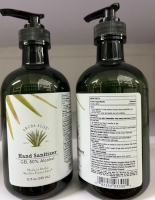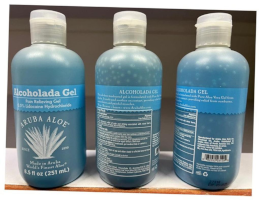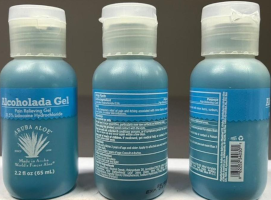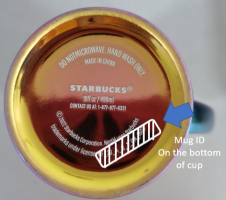
THIS SECTION IS FOR NEWS AND INTERESTING STORIES RELATED TO FOOD, NUTRITION AND FOOD PROCESSING. THEY ARE NOT NECESSARILY RELATED TO KOSHER BUT MAY BE OF INTEREST TO THE KOSHER CONSUMER, MANUFACTURER OR MASHGIACH.



April 5, 2024 from the FDA:
Aruba Aloe Balm N.V. is voluntarily recalling 40 lots of Aruba Aloe Hand Sanitizer Gel Alcohol 80% and Aruba Aloe Alcoholada Gel to the consumer level. The products have been found to contain alcohol denatured with methanol.
Aruba Aloe Hand Sanitizer Gel is used as a sanitizer to help reduce bacteria that potentially can cause disease and is packaged in 12 fl oz (355 mL) dark green plastic bottles with white label reading in part “ARUBA ALOE Hand Sanitizer GEL 80% Alcohol Made in Aruba World’s Finest Aloe”, with barcode 0 82252 03300 5.
Aruba Aloe Alcoholada Gel is used for temporary relief of pain and itching associated with minor burns, sunburn, insect bites, or minor skin irritations and is packaged in two sizes: 2.2 fl oz (65 mL) plastic bottles with barcode 0 82252 34030 1 and 8.5 fl oz (251 mL) plastic bottles with barcode 0 82252 03120 9. The plastic bottles are transparent with a label reading in part “Alcoholada Gel Pain Relieving Gel 0.5% Lidocaine Hydrochloride”.
Lot numbers of the products being recalled is here
Products were distributed between 5/1/2021 and 10/27/2023 and sold in the US online only via the Aruba Aloe Balm N.V. website. Aruba Aloe Balm N.V. has notified all customers that bought these products by email and has offered a discount coupon for a next purchase.
Consumers with questions regarding this recall can contact Aruba Aloe Balm N.V. by Email: recall@arubaaloe.com.
April 3, 2024 from the NPR:
"Cal-Maine Foods, Inc., the largest producer of fresh eggs in the U.S., has temporarily halted production at one of its facilities in Texas after detecting bird flu there, the company announced Tuesday.
"The company says it "depopulated" about 1.6 million laying hens and 337,000 pullets, or about 3.6% of its flock, as a result of the outbreak.
"Bird flu - also known as highly pathogenic avian influenza, or HPAI — is a highly contagious virus typically spread by wild birds that is extremely deadly to avian populations. Human infections are rare.
"Commercial farms sometimes euthanize part of their flock during bird flu outbreaks to limit the spread of the disease, according to the Environmental Protection Agency."

April 4, 2024 from the CPSC :
BLACK+DECKER Model HGS011 Easy Garment Steamers have been recalled because the steamers can expel, spray, or leak hot water during use, posing a burn hazard to consumers.
Consumer Contact: Empower Brands at 800-990-5298 from 8 a.m. to 4:30 p.m. CT, Monday through Friday, email at hgsrecall@brandprotectplus.com or online at www.prodprotect.com/recall or www.blackanddeckerappliances.com and click on “Safety Notices” at the bottom of the page for more information.
Description: This recall expansion involves all BLACK+DECKER Model HGS011 Easy Garment Steamers, including those that were repaired as part of the previous recall in November 2022. The steamers were sold in a variety of colors. The name BLACK+DECKER is located at the base of the steamer. The steamer measures about 11 inches high by 6 inches wide, and has a large handle. The model numbers are printed on the bottom of the steamer and on all sides of the color package, and UPC codes are printed on the sides, back and bottom of the color package.
| Model | UPC |
|---|---|
| HGS011F | 0 50875 82840 7 |
| HGS011S | 0 50875 82839 1 |
| HGS011 | 0 50875 82838 4 |
| HGS011T | 0 50875 00272 2 |
Remedy: Consumers should immediately stop using the recalled BLACK+DECKER Model HGS011 Easy Garment Steamers, and contact Empower Brands to receive a full refund.
There have been continued reports of burn injuries involving units that were repaired as part of the previous recall in November 2022. The remedy has now been changed to a refund for all units. Consumers, including those who received a replacement upper assembly as part of the November 2022 recall, should contact Empower Brands for a full refund.
Incidents/Injuries: Since the recall was announced in November 2022, Empower Brands has received 317 reports of hot water expelling from the recalled steamers, including 82 reports of burn injuries, seven of which were second-degree burns. 94 of these incident reports involved units that were repaired as part of the original recall or models featuring the updated design, including 19 burn injuries.
Sold At: Walmart, Target, Amazon, Bed Bath & Beyond and other stores nationwide, including online at www.walmart.com, www.target.com, www.amazon.com, www.bedbathandbeyond.com, and www.blackanddeckerappliances.com from June 2021 through February 2024 for between $14 and $23.


April 4, 2024 from the CPSC :
Mainstays Electric Mini Choppers have been recalled because the chopper’s blade can operate unexpectedly during assembly or when not enclosed in the container, posing a laceration hazard to consumers.
Consumer Contact: Walmart at 800-925-6278 from 7 a.m. through 9 p.m. CT any day, or online at https://corporate.walmart.com/recalls or https://corporate.walmart.com/ and click on "Recalls" at the bottom of the page for more information.
Description: This recall involves Mainstays Electric Mini Choppers with model number MS14100094536S1. The choppers are rechargeable and cordless, and have a green lid, white body, and clear plastic bowl. They have one blade attachment, which consists of three curved blades on one white plastic spindle. Model number MS14100094536S1 is on the label attached to the bottom of the clear plastic bowl.
Remedy: Consumers should immediately stop using the recalled choppers, and contact Walmart to receive a full refund. Consumers can bring the chopper to their nearest Walmart store for a refund.
Incidents/Injuries: Walmart has received five reports of lacerations, two of which required medical attention, including stitches. Injuries occurred during assembly of the product or during cleaning/handling of the product.
Sold Exclusively At: Walmart stores nationwide and online at Walmart.com from August 2022 through October 2023 for between $10 and $15.
March 31, 2024 from the VinNews:
" NY Assemblyman Sam Pirozzolo (R-Staten Island) is proposing a bill to exempt certain ethnic restaurants, such as pizzerias and matzah-makers, from strict emissions regulations targeting wood- and coal-fired ovens. Pirozzolo argues that these regulations unfairly target businesses that cook ethnic cuisine and suggests that the government should focus on more pressing issues like crime and public safety.
"On the other hand, the Department of Environmental Protection defends the regulations as necessary to reduce harmful emissions and protect public health. The regulations, backed by Mayor Eric Adams, require affected businesses to install costly air filtration systems to reduce emissions from their traditional ovens.
"Pirozzolo’s proposed bill, titled the “Preserving Our Culinary Traditions Act,” aims to waive pollution restrictions on the burning of wood, coal, and other fuels for cooking purposes. He argues that such exemptions are necessary to preserve the rich culinary traditions of New York City and relieve businesses from financial burdens imposed by compliance costs.
"The article also mentions efforts by other lawmakers, such as Brooklyn City Councilman Justin Brannan, who are considering alternative solutions such as tax breaks to help businesses afford the necessary filtration equipment.
"Overall, the debate revolves around balancing environmental concerns with the preservation of cultural and culinary traditions, as well as the economic viability of affected businesses."
March 7, 2024 from the Food Safety News:
"The Food Standards Agency (FSA) has launched a campaign to explain the difference between free-from and vegan labeling.
"Vegan labels are used to support a dietary choice and do not intentionally contain products of animal origin. However, vegan food could still be prepared alongside eggs, milk, fish, crustaceans, or mollusks.
"To use a free-from label, businesses must follow processes to manage the risk of cross-contamination so they do not contain any of the ingredients they claim to be free-from.
"An FSA-commissioned survey found many people didn’t know that vegan products might not be suitable for those with food hypersensitivities to allergens of animal origin and that they need to check for precautionary allergen labeling, such as “may contain” on vegan products.
"Some people are using vegan labeling as a proxy for allergen labeling. Only 55 percent of those who used vegan labeling were at least sometimes aware that vegan products may not be suitable for those with food hypersensitivities to allergens of animal origins due to cross-contamination risks."


March 21, 2024 from the CPSC :
BRS and BULin Liquid Fuel Bottles have been recalled because the portable fuel containers violate the child-resistant requirements for closures under the Children's Gasoline Burn Prevention Act (CGBPA). The closure for the products is not child resistant, posing a risk of burns and poisoning to children.
Description: This recall involves BRS and BULin portable liquid fuel bottles sold individually. The BRS bottle is orange with a black cap and was sold only in a 1000mL size. The BULin bottle is red with a red cap and was sold only in a 1000mL size. Its text is in Chinese. “BRS” or “BULin,” and the bottle’s volume, warnings, and/or directions appear in white lettering on the bottles.
Remedy: Consumers should immediately stop using the recalled fuel bottles, place them out of reach to children, and contact Tentock for instructions on how to dispose of the product to receive a full refund.
Sold At: Amazon.com from January 2023 through December 2023 for between $10 and $13.


March 21, 2024 from the CPSC :
Metallic Mugs included in 2023 Holiday Starbucks-branded Gift Sets have been recalled because if microwaved or filled with extremely hot liquid, the mugs can overheat or break, posing burn and laceration hazards.
Consumer Contact: Nestlé USA at 800-681-1676 from 9 a.m. to 6 p.m. ET Monday through Friday, or online at https://www.nestleusa.com/media/pressreleases/metallicmugrecall or https://www.athome.starbucks.com and click on “Metallic Mug Recall” at the bottom of the page for more information.
Remedy: Consumers should immediately stop using the recalled mugs, and either return them to the place of purchase or contact Nestlé USA for a full refund. Consumers can receive a cash or gift card refund when they return the mug to the store where purchased, or a check from Nestlé USA when they visit https://www.nestleusa.com/info/contact-us-landing, scroll down to “Leave Us a Message”, click on “Complaint”, select “Recall” from the drop down menu, attach a photo of the mug or the gift set identifier code, complete the form and hit send. Proof of purchase (receipt) is not required to receive a full refund.
Description: This recall involves four gift sets containing a ceramic mug with metallic coating that bears Starbucks branding. They were sold in 11 oz. and 16 oz. sizes as part of one of the following gift sets sold during the 2023 holiday season: Starbucks Holiday Gift Set with 2 Mugs, Starbucks Classic Hot Cocoa and Mug, Starbucks Peppermint and Classic Hot Cocoas and Mug, and Starbucks Holiday Blend Coffee and Mug.
Remedy: Consumers should immediately stop using the recalled mugs, and either return them to the place of purchase or contact Nestlé USA for a full refund. Consumers can receive a cash or gift card refund when they return the mug to the store where purchased, or a check from Nestlé USA when they visit https://www.nestleusa.com/info/contact-us-landing, scroll down to “Leave Us a Message”, click on “Complaint”, select “Recall” from the drop down menu, attach a photo of the mug or the gift set identifier code, complete the form and hit send. Proof of purchase (receipt) is not required to receive a full refund.
Sold At: Online and in-store at Target and Walmart, and through Nexcom (military retail outlets) nationwide from November 2023 through January 2024 for about $10, $13 or $20 depending on gift set.
March 19, 2024 - from the Food Dive:
"Unilever, which makes everything from Hellmann’s mayonnaise and Magnum ice cream bars to Dove soap and Axe deodorant, said it would benefit by running a focused portfolio of strong brands in highly attractive categories.
"Once the restructuring is complete, Unilever will be left with four business segments: beauty and wellbeing, personal care, home care and nutrition.
"Unilever said its ice cream division, which makes Good Humor, Talenti, Breyers, Popsicle and Klondike, would most likely be listed as a separate entity. It could also choose to sell the business.
"The separation of ice cream also would help Unilever distance itself from Ben & Jerry’s, a brand known for its social activism platform that often has led to tension with its corporate parent. In 2022, the brand known for quirky flavors like Cherry Garcia and Chunky Monkey sued Unilever after it divested its business in Israel without its consultation."


March 14, 2024 from the CPSC in conjunction with Government of Canada:
Air Fryers and Air Fryer Ovens have been recalled because the air fryers can overheat, causing the handles to melt or break, posing fire and burn hazards. Additionally, the air fryer ovens can overheat and the glass on the door can shatter, posing fire, burn and laceration hazards.
Consumer Contact: Best Buy at 800-566-7498 from 7 a.m. to 6 p.m. CT Monday through Friday or register online at https://www.recallrtr.com/airfryer to receive a refund. Consumers can also go online at http://www.bestbuy.com/productrecalls or www.bestbuy.com and click on “Product Recalls” located under the “Order and Purchase” column located at the bottom of the page for more information.
Description: This recall involves Insignia Air Fryers and Insignia Air Fryer Ovens, model numbers NS-AF34D2, NS-AF5DSS2, NS-AF5MSS2, NS-AF8DBD2, NS-AF10DBK2, and NS-AF10DSS2. The brand name INSIGNIA is on the top or front of each unit. A product rating label on the underside of each unit identifies the brand INSIGNIA and the model number. The air fryers and air fryer ovens have cooking chamber capacities ranging from about 3.4 to 10 quarts, and plastic or plastic and stainless-steel bodies in black and stainless-steel finishes.
Remedy: Consumers should immediately stop using the recalled Insignia air fryers and air fryer ovens and visit https://www.recallrtr.com/airfryer for instructions on how to submit photos of the recalled unit(s), the model number, purchase receipt, and on the destruction of the unit.
Consumers can receive a refund in the form of a refund check or a Best Buy store credit. A consumer will receive the amount on the purchase receipt, or they will receive the average sales price for the model if no receipt is provided.
Consumers should not return the recalled air fryers or air fryer ovens to Best Buy stores. Best Buy has contacted all known purchasers directly.
Incidents/Injuries: The firm has received 24 reports of overheating/melting or glass shattering, including six reports of air fryers catching on fire. No injuries or property damage have been reported.
old At: Best Buy stores nationwide and online at www.bestbuy.com, www.eBay.com, and third-party sellers from November 2021 through November 2023 for between $32 and $180.
| The information posted is from secondary sources. We cannot take responsibility for the accuracy of the information. |
| Comments to webmaster@kashrut.com
© Copyright 2025 Scharf Associates |
|
|||||||||||